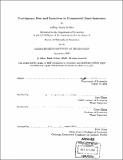Contingency fees and incentives in commercial lines insurance
Author(s)
Wilder, Jeffrey Mark, 1974-
DownloadFull printable version (6.853Mb)
Other Contributors
Massachusetts Institute of Technology. Dept. of Economics.
Advisor
Sara Ellison and Glenn Ellison.
Terms of use
Metadata
Show full item recordAbstract
This dissertation addresses the potential agency conflicts arising between an insurance broker and its commercial clients. Though the broker is hired to find its client the best insurance quote on the market, the broker's contractual arrangements and private information may lead it to stray from this ideal. The first chapter introduces the institutions of commercial lines insurance in the interest of providing a foundation for the empirical inquiries to follow. The second chapter asks whether contingency fees, which are annual payments rewarding the broker for attaining premium volume and profitability targets with an insurer, distort the broker's sales behavior. The analysis uses data on policies written through a privately-held insurance broker in Arizona from 1994 to 2000. I am able to identify the effect of contingency fees because individual agents working at the broker make placement decisions, and only some agents have an incentive to respond to this compensation. Contingency fees are found to distort sales toward insurers that have contracts in effect at the broker. Moreover, agents appear to respond to contractual nonlinearities and are more inclined to place business with insurers offering high marginal incentives. The third chapter asks whether the broker can effectively communicate its private information to the client if it is in the broker's immediate interest to avoid costly search. The client would like the broker to search if the client's current insurer is no longer pricing its coverage competitively. In contrast, the broker would like to avoid costly search, while retaining the client. (cont.) Thus, the broker has an incentive to distort the information provided to the client, always arguing that the client's current coverage is priced competitively. If search is only warranted when a client faces an idiosyncratic price increase, the moral hazard may still induce heightened search activity in response to systematic price increases. The broker cannot credibly communicate to the client the fact that all prices (not just its price) have increased. Using the data set employed in the second chapter, systematic price increases are found to significantly increase client turnover among insurers consistent with the moral hazard hypothesis.
Description
Thesis (Ph. D.)--Massachusetts Institute of Technology, Dept. of Economics, 2002. Includes bibliographical references (p. 103-104).
Date issued
2002Department
Massachusetts Institute of Technology. Department of EconomicsPublisher
Massachusetts Institute of Technology
Keywords
Economics.